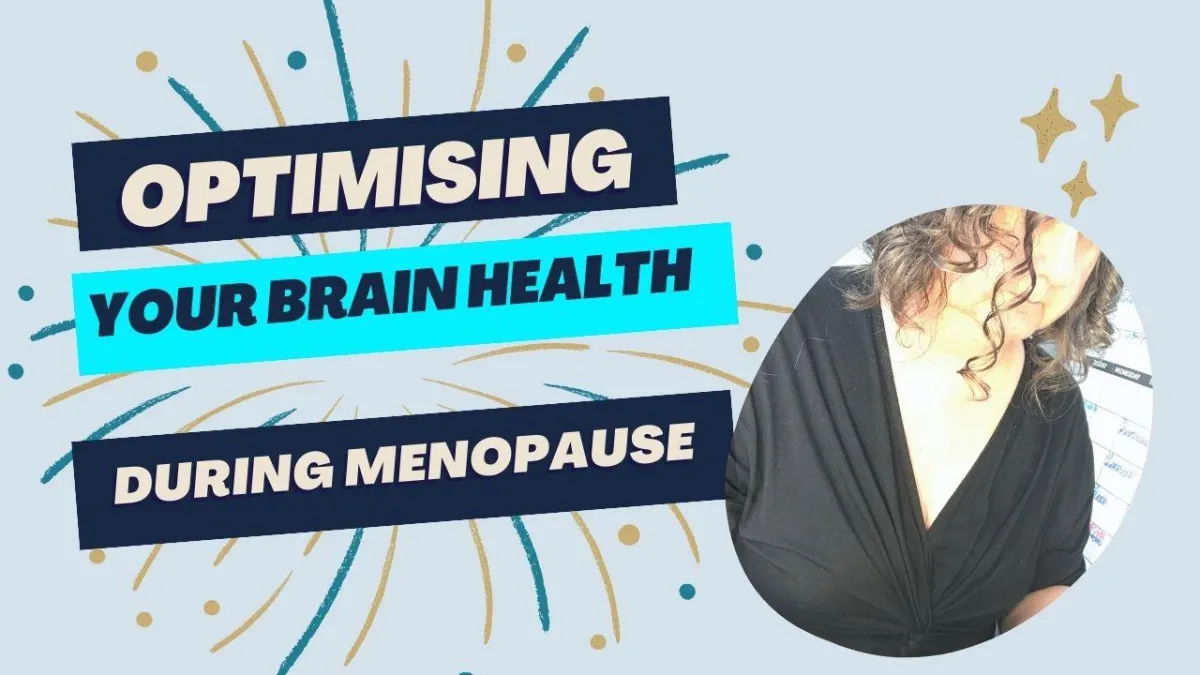Blog
Menopause Midlife & all the ****

Optimising Your Brain Health During Menopause
Introduction:
Welcome to this exploration of how the menopause transformation has an impact on your brain health and how you can maintain your brain health during this hormonal transformation. I'm Tracey Montgomery, your Menopause Strategist, and together, we'll delve into invaluable insights and effective strategies to optimise your brain health during this transformative phase of life.

This page may contain affiliate links. If you choose to purchase after clicking a link, I may receive a commission at no extra cost to you. 👊
Understanding Menopause: A Natural Transition
The menopause transition represents a significant milestone in a woman's life, marking the cessation of menstrual cycles and reproductive function. This natural transition is primarily driven by hormonal changes, notably the decline in oestrogen and progesterone production by the ovaries.
As hormonal levels fluctuate, they exert profound effects not only on physical symptoms like hot flashes and night sweats but also on cognitive function. Oestrogen, in particular, plays a crucial role in maintaining brain health, influencing neurotransmitter activity, blood flow to the brain, and overall cognitive performance. As the oestrogen levels decrease the brain no longer has the same level of signals as previously.
The Menopausal Brain: What's Happening?
During this menopause transition, the brain undergoes notable changes due to hormonal fluctuations. Oestrogen and progesterone, once instrumental for brain function, decline. The brain no-longer has these signals and therefore becomes, for the want of a better word, confused, and thus leading to a range of symptoms collectively known as "menopausal symptoms." This cognitive fog may manifest as many of the symptoms we know can occur during the menopausal transition.
The brain's response to declining hormones can result in disrupted sleep patterns, forgetfulness, difficulty concentrating, mental fuzziness, mood swings, and changes in memory and cognitive processing. Understanding why these changes are occurring is vital for implementing targeted strategies to support your brain health during menopause.
Strategies for Optimising Brain Health
Exercise for Brain Vitality: Engaging in regular physical activity is essential for brain vitality. Aerobic exercises like walking, jogging, or dancing promote blood flow to the brain, stimulate the release of mood-boosting neurotransmitters, and support the brain cells. Incorporating strength training exercises can also enhance cognitive function and overall brain health. Choose an exercise that you enjoy so that you will be more likely to repeat it in the future. Take into account the fact that you may have more fatigue as you age and enter the menopause transition than before so choose a time during the day when you know your energy levels will be higher.
Nutrition Matters: Adopting a healthy diet is crucial at any life but is of particular importance during the menopause transition. Emphasise a Mediterranean-style eating pattern rich in fruits, leafy vegetables, whole grains, and healthy fats. Omega-3 fatty acids from sources like fatty fish (salmon, sardines) and nuts can support brain function and reduce inflammation.
Avoiding processed foods, white grains and excessive sugars is essential for maintaining optimal brain health and maintaining a healthy gut biome.The Importance of Quality Sleep: Adequate sleep is critical for brain health and overall well-being. Some of the menopausal symptoms such as night sweats and insomnia can disrupt sleep patterns, which can then negatively impact cognitive function and mood the following and subsequent days if this is a recurring issue. Establishing a consistent sleep routine, optimising your sleep environment, and practicing relaxation techniques (such as meditation or deep breathing) can promote restful sleep and support cognitive clarity.
Addressing Brain Fog and Cognitive Changes
Menopause transition-associated brain fog can be distressing, especially as we may associate these symptoms with other worrying ageing conditions. These symptoms are more manageable with some slight lifestyle adjustments. Incorporate stress-reduction techniques like meditation, yoga, or tai chi to alleviate cognitive symptoms by reducing cortisol levels and promoting relaxation. Make sure you have simple daily routines, like a morning routine, bedtime routine and plan your day so you have less to remember and fill your brain with. Stay mentally active through reading, puzzles, or learning new skills to challenge and stimulate the brain.
Financial Planning and Future Casting
In addition to physical and mental health considerations, the menopause transition often prompts reflection on financial stability and retirement planning. Many women experience shifts in their financial and personal circumstances during this phase, necessitating proactive planning to secure their future. There has been a significant increase in the number of women finding themselves living alone post 50 years old. Traditionally women have also taken on the caring responsibilities with in a family. Both of these events can adversely affect your future financial circumstance, especially if you find yourself living on your own.
Empowering Your Financial Future
Future casting involves assessing your current financial situation and exploring alternative income options tailored to midlife women. While I'm not a financial advisor, I can guide you through educational resources and strategies to enhance financial security and independence post-menopause.
Taking Charge of Your Menopausal Journey
Menopause is a transformative journey unique to each woman. By prioritising holistic wellness and seeking personalised strategies, you can optimise brain health and overall quality of life during this phase.
Continuation of Your Menopause Success Journey:
The menopause journey is a continuum. From perimenopause and on through into postmenopause, having people who understand and support you is essential. It's not the end of your life's journey; it's a phase, and having the right community can make all the difference.
I make it my mission to support women with their transition along the menopause journey. To talk further please use this link to book a call and discuss further support.
If you would like to join a supportive community, please drop me a line here. I love hearing from midlife women going through the menopausal transition.
Pssst, you can also check out my Menopause Midlife and all the ****. It includes monthly strategies and a community of women at the same life stage as you.
Click here to get your Menopause Morning Rituals to make every day just that little bit easier.
Oh, and come say Hi on Facebook and join the free facebook group Menopause Midlife and all the **** here.
If you would rather have the video version
Check out more resources here:
Negotiating Menopause-Related Challenges in the Workplace
Your Menopause Self-Mastery Checklist:
Here is a quick checklist for you to think about when taking back control and getting back on track during your menopause transition.
Embrace self-care during menopause
Develop resilience through menopause
Goal-set to thrive through menopause
Join a supportive community Menopause Midlife and all the ****
Nurture healthy relationships during menopause
Leverage emotional intelligence for menopause well-being
Self-reflect and monitor personal growth throughout your menopausal transition.

What Everyone Ought to Know About Menopause in the Workplace
07 March 2022
Menopause affects 100% of women and can have devastating effects on them, their colleagues and their workplace. Does your HR department have a Menopause in the Workplace Policy in place?

Is Your Pension Future Proof?
14 March 2022
In today's financial uncertainty have you planned for your retirement? Could you create a passive income to increase your pension pot?

Menopause Tiredness All The Time
28 March 2022
Every day my inbox is flooded with questions about menopause. People want to know why menopause causes fatigue

The Cost-of-Living Crisis and What you can do to Thrive
04 April 2022
It’s all over the news and social media, there is a rapidly developing cost of living crisis. For many there already was and has been for some time.

5 Common Symptoms of Perimenopause and Understand How to Accept Them
11 April 2022
Let’s just make it clear; 100% of women will go through perimenopause and on into menopause. 99% of women going through ‘The Change’ will experience some symptoms that can affect daily life to some degree.

Can You Start an Online Business When You're Over 50?
18 April 2022
Like most of us I didn’t always have a flexible work regime and found myself working hours for a fixed income that didn’t quite meet the lifestyle I wanted to lead.
In fact, it was not all that long ago that I had to totally reassess what I was doing and where I wanted to be.

26 April 2022
Coping With Empty Nest Syndrome as a Single Parent
As if coping with midlife, erratic hormones and perimenopause was not enough, the children who you have spent the most significant part of your life nurturing and raising are ready to leave home and spread their wings.





